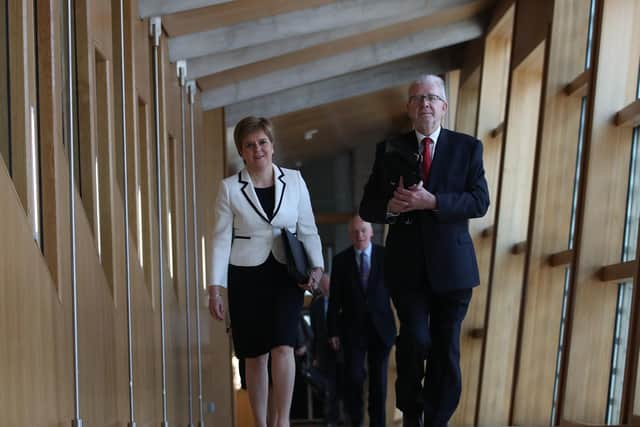Why are so many SNP MSPs standing down at the 2021 election?
Political parties, like football clubs, need to find a balance between experienced pros and fresh talent if they are to remain competitive. New faces must be introduced to the first team squad periodically to ensure everyone is kept on their toes and results go the right way.
The SNP is no different to the Conservatives or Labour in this regard. The big two of UK politics have undergone massive personnel changes over the last decade.
Advertisement
Hide AdAdvertisement
Hide AdWhen Gordon Brown left Downing Street in 2010, many of the big beasts of New Labour went with him. Others chose to stand down after Ed Miliband's 2015 election campaign ended in defeat. The Corbyn era proved the final straw for many old Labour hands.


Meanwhile, the Tories ruthlessly purged MPs who dared criticise Boris Johnson's Brexit dream. To be a senior Conservative in 2020 requires complete faith in the idea the UK will be better off outside of the EU, regardless of whether a deal can be reached. Some veterans - Ken Clarke among them - decided this was something they could not do and called it quits.
Out with the old
Big changes have been taking place in the SNP as well. So far, six Nationalist MSPs have announced they will not stand for reelection in 2021.
Gail Ross, James Dornan, Bruce Crawford, Richard Lyle, Mike Russell and Stewart Stevenson are all voluntarily standing aside for personal reasons.
Ms Ross, 42, has said she decided to go after just one parliamentary term because of the geographical distance between her Caithness constituency and Scottish Parliament and the pressures this put on her family.
Mr Russell, who will be 67 in August, said it may be time for someone younger to represent the constituency.
Mr Stevenson, an SNP veteran first elected in 2001, will be 75 next year. He said that "leaving Parliament does not mean that I shall be leaving politics".
Mr Dornan, 66, said he was "looking forward to having more time to spend with my partner, catch up with my family and do some of the things I've been putting off over the years whilst campaigning for Scottish independence as an elected representative."
Advertisement
Hide AdAdvertisement
Hide AdDornan, Stevenson, and Russell are all of pensionable age and may simply want to enjoy life without the pressures of Holyrood.
But it's worth remembering that age doesn't tend to curtail political careers like it does in other jobs. All three are younger than Bernie Sanders, the front-runner to become the next Democratic candidate for the US presidency.
One eye on 2021
This is a big year for the SNP in several regards. When Holyrood resumes after its summer recess in September, the starting gun will be fired on the race to win the 2021 Scottish elections the following May.
Nicola Sturgeon will be asking voters to return her party to power for what would be an unprecedented fourth term. What will she be offering them?
Firstly, the right to hold an IndyRef2. Boris Johnson has already refused SNP requests for the right to hold a second referendum. Sturgeon knows that position is unlikely to hold if she can win a majority of MSPs, elected explicitly on an IndyRef2 platform.
But the constitutional debate is not enough on its own. The First Minister must be able to point to fresh ideas and talent within her party.
One example is Kate Forbes, the new finance secretary. The Skye, Lochaber and Badenoch MSP's promotion to the cabinet last month wasn't a surprise after she successfully stood in for Derek Mackay - after his ignominious departure earlier - to deliver the Scottish budget.
That means seven out of the 12 members of Sturgeon's Cabinet are now women. The Scottish Government , including junior ministers, will be fully gender balanced at 13 men and 13 women.
Advertisement
Hide AdAdvertisement
Hide AdThe SNP - like all major parties - is working hard to find more female candidates to stand at future elections.
The 1999 Scottish Parliament election returned 48 women to the chamber out of 129 MSPs. By the 2016 election that number had fallen to 45.
That's a situation Nicola Sturgeon would like to change, with her own party taking the lead.
The Westminster dimension
Winning a Westminster constituency used to be vital to the career prospects of any ambitious SNP member. No longer.
Nicola Sturgeon has risen to the top job without setting foot in the Commons. The party's power base is now firmly in Edinburgh.
That's one reason why Angus Robertson wants to win a Holyrood constituency in 2021, rather than planning a return to Westminster after losing his seat in 2017.
He faces a challenge for the Edinburgh Central seat from Joanna Cherry, another senior Nationalist best known for her work in the Commons.
Could other SNP MPs declare themselves available for Holyrood selection? You wouldn't bet against it.
Advertisement
Hide AdAdvertisement
Hide AdBeing an opposition MP from 2017 until December last year meant you held real political power. With numerous Brexit bills crashing and burning, every vote counted in the chamber.
But with a majority of 80, the Conservatives are now firmly in control. Landing any kind of blow on the UK Government has become a lot harder.
With that in mind, some SNP MPs might decide they would rather take their chances in Holyrood.
Comments
Want to join the conversation? Please or to comment on this article.